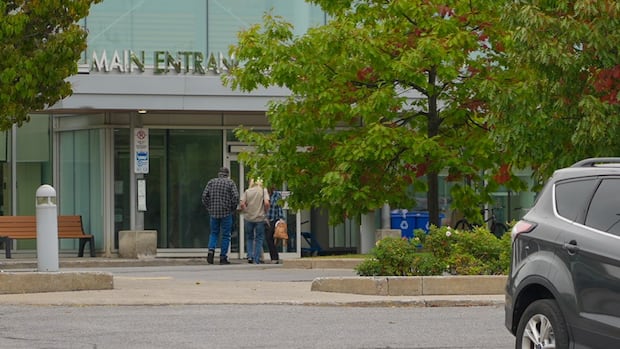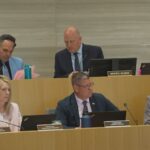OttawaThe city is joining a growling list of Canadian municipalities competing to attract medical professionals through financial incentives and alternative models of care.More than 40% of residents are currently without a family doctor or a nurse practitionerAya Dufour · CBC News · Posted: Sep 24, 2025 4:00 AM EDT | Last Updated: 4 hours agoPatients enter Cornwall Community Hospital a day after the local city council adopted 18 recommendations to improve access to primary care across the region. (Felix Desroches/Radio-Canada)Cornwall, Ont., is joining the growing number of Canadian municipalities competing to attract medical staff. The city is updating its 30-year-old recruitment and retention strategy by adopting 18 recommendations, some of which include amending programs to include nurse practitioners and agreements with internationally trained professionals.”It’s certainly not a great system where municipalities have to compete against each other, but if we don’t pony up and have a program, we’re going to be at a loss,” said Cornwall Mayor Justin Towndale, who spearheaded the task force on medical recruitment. About 21,000 people living in the area are currently without� access to a primary care doctor or nurse practitioner, according to Seaway Valley Community Health Centre director Erin Killoran. “We do keep a waiting list and it has grown significantly over the last couple of years, to about 2,400 people,” she said. Some of the recommendations Cornwall city council will be acting on include speeding up applications, creating pathways for internationally trained professionals, deepening regional collaboration, allowing nurse practitioners to apply to existing programs and broadening the reach of those programs.Council will also work on creating a post-graduate medical residency program to keep medical professionals in the community.It also plans to explore the creation of a municipally supported health hub, like the one in Carleton Place.Financial incentives play a key roleTowndale says financial incentives are a way for Cornwall to level the playing field with other municipalities.He said the city was recently in discussion with a doctor looking to relocate from the U.S., but that person eventually decided to move to B.C. — a good example of how hard it is to compete with other regions.”We just can’t compete,” Towndale said. “Let’s use Banff, Alta. as an example: It’s beautiful out there. We don’t have a mountain or lake in our backyard.”I think some people are going to look for those amenities, or larger cities.”This bold idea could change how cities attract family doctorsWhen Colwood, B.C., lost its last family doctor, the mayor didn’t wait for help from the province. Instead, he came up with a bold idea that’s turning heads across Canada and could reshape how communities attract and retain doctors.Towndale says it could take up to five years to assess whether the recommendations and actions taken are working. Killoran hopes some actions can be taken in the short term to alleviate the acute shortage of professionals. She’s hoping the expansion of scholarship, loan and relocation assistance programs to nurses will have an immediate impact. “It has been increasingly difficult to fill positions, particularly nursing positions,” she said. “I think the expansion of those programs will make a significant difference.” She argues another change that would make a difference would be to close the wage disparity between professionals who work in community health settings versus hospitals, but that isn’t a municipal jurisdiction. ABOUT THE AUTHORAya Dufour is a bilingual journalist with CBC Ottawa who reports for digital, radio and television. She was previously based in northern Ontario. Tips and story ideas can be sent to aya.dufour@cbc.ca
Wednesday, 4 Mar 2026
Canada – The Illusion
Search
Have an existing account?
Sign In
© 2022 Foxiz News Network. Ruby Design Company. All Rights Reserved.
You May also Like
- More News:
- history
- Standing Bear Network
- John Gonzalez
- ᐊᔭᐦᑊ ayahp — It happened
- Creation
- Beneath the Water
- Olympic gold medal
- Jim Thorpe
- type O blood
- the bringer of life
- Raven
- Wás’agi
- NoiseCat
- 'Sugarcane'
- The rivers still sing
- ᑲᓂᐸᐏᐟ ᒪᐢᑿ
- ᐅᑳᐤ okâw — We remember
- ᐊᓂᓈᐯᐃᐧᐣ aninâpêwin — Truth
- This is what it means to be human.
- Nokoma











